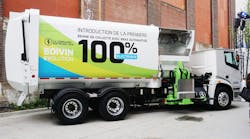MONTREAL. The Lion Electric Co. (Lion) and Boivin Évolution (BEV), both based in Quebec, have developed a zero-emission Class 8 garbage truck with a fully electric waste collection hopper and automated arm, which was displayed at the 2019 Movin’On Summit last week.
With the combined expertise of each company, the Lion8 chassis and the BEV all-electric automated side-loading hopper can be used to collect household waste, recycling, and organic material.
According to Yves Provencher, senior director of truck business development at Lion, orders for the truck have already been placed and expects the first dry box delivery models to be delivered in North America as early as September 2019.
The advantages of the Lion8 with BEV side-loading hopper:
- Range of up to 400 km or a full day of operation (1,200 homes) on a single charge
- No noise pollution
- Optimal visibility and turning radius
- Zero greenhouse gas (GHG) emissions (43% of GHG emissions in Quebec come from transportation and heavy-duty vehicles in particular)
- No hydraulic fluid needed for pumps, pipes, and hoses. All hopper and arm movements are powered by the battery that drives electric motors for each function
- Overnight recharging when the truck is not in operation and when demand for electricity is lower, which reduces energy costs
- Savings of up to 80% on total energy costs
- 60% lower service costs thanks to the simple, low-maintenance electric powertrain that has few components
- Oil-free operation with very few moving parts
- Longer lasting brakes due to regenerative braking system
“Thanks to our partnership with Lion, we can offer an all-electric automated waste collection truck, a first in the waste collection industry,” said Claude Boivin, founder and CEO of BEV. “This technological breakthrough will transform waste collection through better performance and a smaller ecological footprint.”




